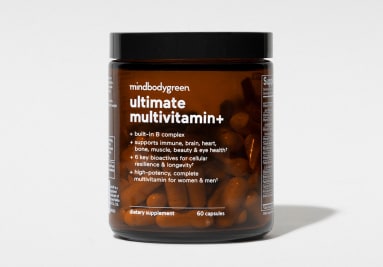How To Balance Your Hormones Naturally (Yes, It Can Be Done)
Hormone balance isn't always easy, but it is possible.


mbg Contributor
Julia Guerra is a health and wellness writer reporting for mindbodygreen, Elite Daily, and INSIDER.
Image by Lucas Ottone / Stocksy April 28, 2023 Our editors have independently chosen the products listed on this page. If you purchase something mentioned in this article, we may The role hormones play in the human body spans well beyond a person’s pubescent years. For better or worse, estrogen, testosterone, progesterone, thyroid hormone, insulin, leptin, ghrelin, cortisol, and so on all dictate how your body operates, from your emotional state to your physical well-being. Similar to how a bad night’s sleep can throw off your entire day, hormonal fluctuations can lead to a host of issues over time. The easiest way to prevent this from happening is to learn how to balance hormones naturally. 
Advertisement
This ad is displayed using third party content and we do not control its accessibility features.
The importance of hormone balance
At their core, hormones are simply chemical messengers.
Licensed naturopathic physician and co-founder of Terrain Natural Medicine, Kelcie Rosendahl, N.D., tells mindbodygreen that the overarching purpose of hormones is to regulate the activity of cells and tissue in various organs of the body. When hormones are balanced, you feel good. When they’re not, virtually everything from your appetite and metabolism to reproductive cycles and sexual function can be affected.
“It takes only very small amounts [of hormone fluctuations] to bring about major changes in the body,” Rosendahl explains. “Some common signs that you may have suboptimal levels of one or more hormones include changes in your mood and/or periods, suboptimal sex drive, concerns about your skin or sleep health, unexplained weight gain, or feelings of tiredness.”
How to balance hormones naturally
Thankfully, there are natural ways you can help support and balance your hormones to optimize whole-body health and well-being.
Advertisement
This ad is displayed using third party content and we do not control its accessibility features.
The age-old saying “you are what you eat” rings true with hormones. The types of food and beverages you consume directly correlate with your hormone levels and can have a positive or negative effect on how they move through the body. This doesn’t just mean reproductive hormones—there are other key hormones that impact overall health, such as hunger hormones (e.g., insulin, leptin, and ghrelin) that help regulate a person’s appetite, fullness, and blood sugar levels.
“It’s all connected,” says Chicago-based registered dietitian behind the recipe and nutrition blog Once Upon A Pumpkin, Maggie Michalczyk, R.D. So when it’s time for a meal or snack, you’re not just filling your stomach; you’re supporting (or hindering) your hormone functionality.
According to Michalczyk, the best meals and snacks for hormone balance are nutritionally balanced—i.e., they contain protein, healthy fat, and fiber-rich carbohydrates. Leafy greens, veggies, certain fruits (like berries), nuts, seeds, and fatty fish are all great options, Michalczyk says, as whole, unprocessed foods “can help maintain healthy levels of hormones like insulin (blood sugar hormones), cortisol (stress hormones), and others.”
Of course, too much of a good thing can also be a bad thing, so even the healthiest of foods should be eaten in moderation. For example, certain plants and seeds (e.g., flax, soy, berries, etc.) are rich in estrogen-like compounds called phytoestrogens, which some studies suggest can influence hormone levels in females. According to a 2020 Nutrients review, it’s still unclear how phytoestrogens affect the female body1, so it’s best to work with a registered dietitian or endocrinologist if you have unique hormonal health concerns.
Processed foods, refined sugars, and alcohol, on the other hand, are all foods to avoid for hormonal balance as these are known hormone disruptors and can impact inflammatory processes in the body, hormone signaling, insulin levels, and so on.
What’s more, some food groups (like dairy and gluten) can contribute to unwanted hormonal fluctuations in certain individuals. That’s why registered nurse, holistic nutritionist, and certified women's health coach Brooke Davis, R.N., recommends working with a nutritional professional “to identify any food sensitivities or intolerances to investigate [hormonal health concerns] further.”
2.
Through supplementation
Of course, you shouldn’t rely on supplements alone to meet your daily recommended nutritional standards, and here’s why: When you eat an abundance of fruits and vegetables, you’re receiving (and therefore benefiting from) the full entourage effect of their micronutrients, meaning “their effects are elevated because of the complementary compounds within the food,” says integrative and functional nutrition practitioner and advisor for menstrual care product company rhythm, Emily Brown, M.S.
Consuming a combination of nutrients at once (versus taking an isolated substance) also contributes to how your body will ultimately respond to them. And certain nutrients (like minerals) not only have a profound impact on hormonal balance, but can yield unwanted results if taken in high doses.
For example, let’s say you feel tired. After doing some research, you may discover that low iron levels can cause feelings of tiredness. So, you decide to take an iron supplement to help you feel more awake. But a lack of iron might not be the culprit—and adding more to your diet may end up causing additional health issues.
You see, copper is required in the conversion of dopamine (the hormone of reward and motivation) to epinephrine (aka adrenaline, the fight-or-flight response hormone). If you’re low on copper, the conversion suffers, which, Brown says, can lead to low energy. “Nutrients and nutrient deficiencies impact our entire body, including many hormone fluctuations,” Brown tells mindbodygreen. “If the initial feelings of tiredness is from low copper to begin with, that ‘blind spot treatment’ of iron could further your feelings of low energy and initiate additional hormonal changes.”
The goal is optimizing your micronutrient intake so that you’re getting recommended doses of vitamins, minerals, and other key nutrients (think: omega-3 fatty acids, choline, and dietary fiber) to ensure your endocrine system has everything it needs to support whole-body health and well-being.
That said, it can be really difficult to meet all of your nutritional needs on a daily basis (many Americans aren’t2). For anyone struggling to meet their micronutrient intake goals through diet alone, supplements can be a great way to fill in the gaps.
mindbodygreen’s vegan ultimate multivitamin+, for example, is packed with hormone-supporting ingredients—including a powerful vitamin B complex, vitamin D, iodine (an essential component of all thyroid hormones), and the trace mineral boron, which encourages the functionality of steroid hormones3 responsible for a healthy metabolism, homeostasis, and reproduction.*
Advertisement
This ad is displayed using third party content and we do not control its accessibility features.
3.
Through physical activity
In addition to tailored nutrition, one of the easiest ways to balance female hormones is through physical activity.
Board-certified OB/GYN Stephanie Brownridge, M.D., says exercise has great influence over metabolism, the way the body responds to stressors, and even reproductive hormones. On the other hand, unwanted hormonal changes can lead to low energy levels, which can affect your motivation to exercise, continuing the problematic cycle.
Overall, however, a healthy workout routine can have a highly positive impact on your hormones. According to Alisa Vitti, the founder of hormonal health center FLO Living, functional nutritionist, and women's hormone expert, exercise can “reduce circulating cortisol levels during or after; decrease circulating estrogen levels; boost endorphins, serotonin, dopamine, testosterone and the human growth hormone; have profound effects on the thyroid hormone; and help promote insulin sensitivity.”
As far as which exercises are best for hormone regulation, Brownridge tells mindbodygreen it depends on the individual. Those who over-exercise—especially those with a low body mass index (BMI), for example—can end up in a state of hormonal suppression (re: stunted generation) that influences the body’s homeostasis. “This can result in menstrual changes and nutritional deficiencies, which can even affect the bones. Less exercise, or more restorative exercise such as yoga, may be helpful in these circumstances,” Brownridge says.
Brownridge warns it can be more challenging for women with certain hormonal health issues and a slightly higher BMI to manage weight through diet and exercise, but cardiovascular exercises and weight training can help. If a person does not have any specific hormonal health concerns but is aiming to optimize his/her health, however, “any exercise that is enjoyable is recommended in moderation,” Brownridge says.
4.
Through lifestyle changes
A surprising array of lifestyle choices can affect your hormones—many of which the average person is unaware of. According to Jenna Blake, MSN, FNP-C, a board-certified nurse practitioner, functional hormone specialist, and the owner of Her Rooted Wellness, calls out that one of the most concerning daily environmental endocrine disruptors is cleaning products.
Yes, you read that right: From the types of sprays you use to clean your countertops to the detergent and softeners you use to wash your bedding and clothes, a majority of the most popular products on the market contain toxic chemicals that can have a negative impact on your hormones.
One such chemical group is called phthalates, which are used in virtually everything from plastic bottles to personal care products. According to a 2022 Environment International study analyzing healthy pregnant women, phthalates may disrupt the placental corticotropin-releasing hormone (pCRH, the hormone that triggers the onset of labor), and other research suggests they can have negative effects on our neurological and developmental health4 as well.
The solution, Blake says, is to choose non-toxic options whenever possible.
“Most conventional personal care and cleaning products contain endocrine-disrupting chemicals that can mimic the hormones in our body and throw our system into complete disarray, especially estrogen levels,” Blake explains. An easy tip she shares with clients is to avoid anything that is fragranced or includes “fragrance” in the list of ingredients—that goes for candles, perfumes, and lotions, too.
Advertisement
This ad is displayed using third party content and we do not control its accessibility features.
5.
Through stress management
What runs the world? Stress. Unfortunately, when you’re juggling work maintaining a household, running around after little ones, and the many other everyday responsibilities an individual may have piled on their plate, there’s an abundance of stress to go around. When it does, it comes down—hard—on your hormones.
According to Michalczyk, consistently dealing with stressors can lead to elevated levels of the stress hormone cortisol over time. From there, these elevated levels can result in various issues, such as changes in appetite, hair health, and sleep hygiene. External stressors can also impact your immune system and lead to suboptimal immune defenses. But how?
Brown breaks it down like this: Stress impacts pro-inflammatory pathways, which can cause confusion in the body, almost like a game of telephone: “We want the hormone that was sent to be received at the target cell so everything works well. But when inflammatory pathways are involved, these signals can get confused, and it impacts us down to the cellular and genetic level.”
To help clients balance hormones naturally through stress management, Brown creates what she calls “mental health toolkits” to address areas of their holistic needs that need to be nurtured. These stress management tools can include breathwork, nutrition plans, expressions of gratitude, meditation, improved sleep hygiene, journaling, making realistic to-do lists, and drawing (to name a few).
Frequently Asked Questions
What are the signs of suboptimal hormone levels?
Some of the most common signs of hormone fluctuations are changes in mood or menstrual cycles, low sex drive, and unexplained weight gain, among others. Hormones also affect how well you sleep, so if you’re experiencing changes in your sleep health or feeling tired during the day, hormonal fluctuations could be the culprit.
How can I balance my hormones fast?
How fast a person can balance their hormones naturally varies, depending on the root cause and severity of the hormonal fluctuations. Optimizing your hormone levels could take days, or it could take months.
Advertisement
This ad is displayed using third party content and we do not control its accessibility features.
The takeaway
Hormones directly affect virtually every part of the human body, which is why it is so crucial to keep them balanced. However, it's a task easier said than done.
If you feel your hormones are out of sorts, there are a handful of ways you can balance your hormones naturally. Some of the easiest fixes include making changes in your diet, taking a supplement like the mindbodygreen’s ultimate multivitamin+ to fill in any nutritional gaps, and committing to a regular exercise routine.
If you are pregnant, breastfeeding, or taking medications, consult with your doctor before starting a supplement routine. It is always optimal to consult with a health care provider when considering what supplements are right for you.

 Hollif
Hollif 


































